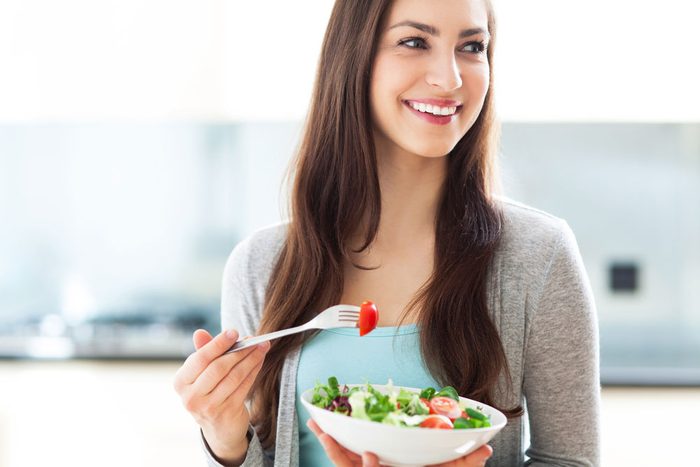
A healthy way to eat for your age
Our nutritional needs change through the years; there are foods you should get more of-and food-related missteps you should avoid-whether you are pregnant or planning to become pregnant soon, juggling a hectic work and home schedule, or going through menopause. We spoke to dietitians who specialize in women’s health to get their tips on how you can maximize your diet for your specific age group and stage of life.

How to eat in your 20s and 30s
At this age you’re probably going flat out at work, partying a little, thinking of having kids, or chasing after young children-all while trying to fit in a social life. As a result, your energy needs are high, so protein should be a vital component of your diet. You’re also laying the foundation for your future health, so poor choices now may translate into heart disease or diabetes in later life. Get lots of whole-grain breads, quinoa and rice; they have been shown to slash the risk of heart disease.
Iron deficiency is a possibility during these years-if you have heavy periods, for example-and you may also need to boost folate levels if you are thinking about pregnancy. Get these nutrients from foods such as clams and pumpkin seeds (for iron), and beans, lentils and peas (for folate). Also, consider taking a supplement, but check with your doctor beforehand.
Your bone mass is reaching its peak during this period. At no other time in your life will you have as much calcium stored away as you do right now. After you reach your 40s, it will start to slowly seep away, so it’s vital that you reach the highest bone density possible during your 20s and 30s-that means consuming dairy, and other calcium sources, is key.
Ideal foods for you now
Bananas: They contain magnesium to help you deal with PMS and counter sugar cravings.
Oranges: These fruit are full of vitamin C, an important nutrient because it helps to build collagen in the bones, cartilage, muscle and blood vessels, and helps with the absorption of iron.
Spinach: Folate comes from various types of greens, so if you don’t like spinach, any green leafy vegetable will work; so will fortified cereals and whole-grain breads. A pill alone won’t do-even if you are taking a supplement, you still need dietary nutrients.
Fatty fish: That includes fresh and canned salmon, rainbow trout and mackerel.
Plain yogurt: It provides the fat you need and helps your body absorb vitamin D, which in turn helps it take in calcium to guard against osteoporosis later in life.
Protein and whole grains: Proteins (such as chicken and lean beef) and whole grains keep you feeling full, provide stamina and help maintain stable blood sugar levels.
Mistakes to avoid
• Consuming too much caffeine, pop and alcohol All of these will diminish calcium and affect how your body uses nutrients from food.
• Not eating regularly throughout the day Doing so will play havoc with your blood sugar levels.
• Cutting out necessary food groups (for example, not eating carbs in an effort to lose weight, or cutting out dairy).

How to eat in your 40s
This is the prime time for preventing health issues in later life, such as high blood pressure, high cholesterol and excessive weight gain. Your life is probably busier than ever, but you may not be as physically active as you once had time for-after all, driving the kids to soccer or ballet practice and working at a computer all day don’t get your heart rate up.
You may also find yourself becoming premenopausal, meaning you’ll notice some changes in your body shape and metabolism. As your estrogen levels diminish, you will find more fat deposits around your middle; your cholesterol may also rise and your bones may start to weaken.
Your iron and calcium needs are still high, but avoid foods that contain these nutrients but also contain high amounts of sugar or “bad” fats, in order to prevent weight gain. Good-for-you fats found in high-quality mono- and polyunsaturated oils (for example, olive or canola) are great choices. Try to eat more fish, and boost your grain and fibre intake to keep your bowels healthy.
Ideal foods for you now
Lemons: Try them for a detoxifying, purifying effect on your skin and organs. Toss slices into a glass of cold water or a mug of hot water every morning.
Fish: Choose those high in omega-3 fatty acids-such as salmon and rainbow trout-which are great for helping the skin stay hydrated. Plus, they have an anti-inflammatory effect.
Eggs: They are high in protein and zinc, which helps the body absorb vitamin A, a nutrient that is key to healthy skin.
Almonds They contain vitamin E and calcium, and are also a source of protein and “good” fat.
Apples: They are a source of fibre and are also high in pectin and vitamin C, which are good for fresh-looking skin.
Mistakes to avoid
• Eating too much As you gradually expend less and less energy, you should change your portion sizes accordingly.
• Not eating enough protein It keeps you feeling full, enables you to digest carbohydrates more slowly and prevents fat from depositing around your stomach.
• Eating too many takeout or convenience foods They are often high in fat and salt, which may lead to high blood pressure and other health problems.
• Eating low-fat foods that are high in sugar You do need some fat in your diet (and it keeps you looking younger). Plus, manufacturers may try to improve the flavour of low-fat foods by increasing the sugar, so if you’re watching your fat intake, read the label and check the amount of sugar, too.

How to eat in your 50s
The onset of menopause brings a host of changes, from the shape of your body to how you feel about yourself. Some of the symptoms you may experience, such as hot flashes, sleeplessness and memory loss, can range from mildly annoying to debilitating.
Iron becomes less of an issue once you stop having periods, so it’s okay to eat protein sources other than red meat. However, you still need plenty of calcium to protect your bones, so do load up on dairy and other sources of calcium.
Now is the time to boost your intake of antioxidants in order to help prevent common chronic conditions that can occur later in life, such as cardiovascular disease and cancer. And plenty of fibre and water are essential for healthy bowels.
Ideal foods for you now
Soy: It contains high levels of phytoestrogens, which some studies have suggested help to balance hormones and mitigate some of the symptoms of menopause. And tofu is a protein that has been shown to have a positive effect on bone density.
Lentils: Plant-based proteins can help to regulate hormones.
Fresh vegetables: They are high in natural fibre and will help prevent fat from being deposited around your stomach.
Watermelon: This and other fruit with high-water content, such as apples and grapes, keep up the natural hydration levels in your body.
Mistakes to avoid
• Eating too much Studies show you put on a pound each year after you turn 30 because your metabolism slows down as you age, so portion size becomes critical at this stage.
• Eating mindlessly Pay attention and make every mouthful count nutritionally.
• Drinking too much coffee or alcohol These can worsen any sleeplessness, anxiety or depression you may be experiencing.
• Eating too much spicy food This can exacerbate hot flashes.

How to eat in your 60s and beyond
It’s an unfortunate fact that the older you are, the more likely you are to develop a chronic ailment. Cardiovascular disease, high blood pressure, diabetes, arthritis and others are all common in this age group-so you may need or want professional help tailoring your diet at this stage. Low-salt, nutrient-rich foods are essential for your continued good health.
Memory loss and depression can also become problems as we age, so try to boost your intake of foods with omega-3 and -6, such as nuts and seafood, as these have been shown to help combat both. Omegas also reduce the risk of cancer and Alzheimer’s disease.
More than ever, you need to protect your bowel health: Eat yogurt regularly and maintain a high-fibre diet.
Ideal foods for you now
Blueberries: This fruit, packed with antioxidants, is great for circulation and for healthy brain function.
Fish: Omega-3s found in fatty fish can help maintain healthy brain cell activity, and lower the risk for heart disease as well as depression.
Macadamia nuts: They are excellent for preventing high cholesterol, and are full of antioxidants.
Spinach: It is one of the highest sources of lutein, an antioxidant that can help stave off macular degeneration, a leading cause of visual impairment.
Cheese: Dairy foods are packed with nutrients, and are great for helping to maintain bone health.
Mistakes to avoid
• Eating too much salt Your sense of taste deteriorates as you age, but adding too much salt to compensate will raise your blood pressure.
• Not drinking enough water and not eating regularly enough You may not feel as thirsty as you age, but you still need regular fluids to help maintain good mental cognition and bowel health.
• Not getting exercise outside Exercise is important at any age and if you stay inside too much, your vitamin D levels will be compromised, which affects bone health.
• Eating too much saturated and trans fat These “bad” fats make your circulation sluggish and affect brain function. And nobody wants that-at any age!
Related:
• Vitamin Needs at Every Age
• 6 Anti-Aging Yoga Poses
• The Top 5 Anti-Aging Foods
